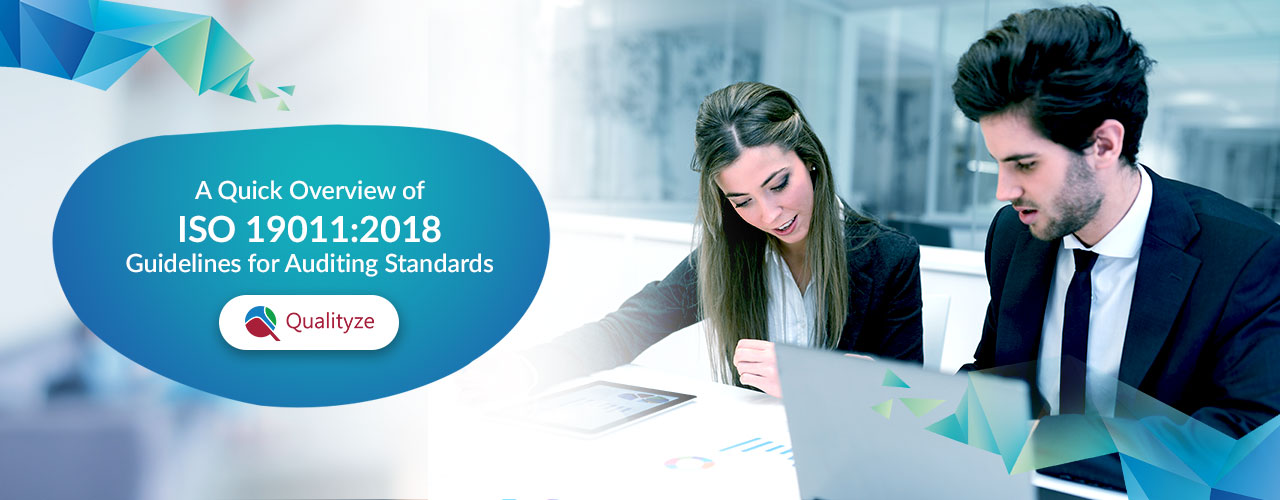

Calculate your potential savings with our ROI Calculator
ROI Calculator
Audit Management Systems are vital for organizations to maintain a culture of continuous improvement while achieving business objectives. There has been a recent upgrade made to the ISO 19011:2018 Guidelines for Audit Management Systems to help organizations maintain a competitive edge in the marketplace.
The most recent version released in July announces the ISO 19011:2018 Guidelines for Audit management systems from the basic principles of audit, audit management program, performing audits and managing the audit findings while setting out the guidelines for evaluation of the competency level for the people involved in the entire audit process.
There is an increased emphasis on risk-based audit processes in the new revision of auditing principles to drive continuous improvement more effectively. The new principles also talk about harmonizing the multiple systems available in a place with a standardized approach for the entire auditing process.
The current revision of the standard demonstrates the increasing number of standards for management systems include the recent revisions of commonly used standards such as ISO 9001 and ISO 14001. However, the new revision is still under the Committee Draft (CD) stage that gives all the countries involved freedom to comment on their opinions for the draft before it finally gets published.
“When the standard was last published in 2011, there were 11 management system standards, but that number has since grown significantly to 39, with 12 others in development.” Says Denise Robitaille, Chair of ISO/PC 302, the ISO project committee responsible for the revision.
This revision is intended to serve the needs of sector-specific standards for different organizations. Since one can easily find the management standards covering different aspects including environment, services, health and medical, information technology and more, there is a need for robust auditing processes for these systems to reflect the effectiveness of new standards being developed.
ISO 19011 is meant for all the organizations that need to conduct internal or external audits of a quality management systems they are using. It is suitable for a broad range of potential users, including auditors. If you are also implementing quality management system, you will have to conduct audits of management systems for regulatory and compliance purposes.
ISO 19011 also includes the guidelines to conduct the external audits, for certification and supplier quality check, to support the implementation of quality management systems. These guidelines are based on seven basic principles.
The auditing of management systems is based on seven fundamental principles that make an audit management system effective tool to support the quality processes, controls, and policies. It guides the organization with critical information to act upon and improve its overall performance. Following these principles enable auditors to work independently since they can get more relevant audit findings.
The seven principles are briefly explained below:
It is also referred to as the foundation of professionalism for auditors as well as the individuals involved in the audit program. They should perform all their duties with proper ethics, responsibility, and honesty. They should perform the audit activities for which they feel competent. Most importantly, they need to be unbiased in all their dealings and should be influenced while making any final call of judgment.
Auditors need to demonstrate all the audit activities and materials including reports, findings, and conclusions accurately. They should report every major and minor obstacle they experienced during the audit even if it is a difference of opinions between him/her and the audit team. The clear, timely, and truthful communication is the key to the successful auditing of the management system.
Auditors should exercise due care for the tasks they are performing since the audit clients and the other involved parties have shown trust and confidence in them. They should not compromise on professionalism when it comes to making judgments in different audit activities. The more they will exercise due professionalism, the more reasonable judgements they will be able to make.
It might sound very cliché when we talk about the security of information, but it’s quite critical to care for. Auditors should, at not condition, disclose the information related to their duties including the errors and findings they encountered inappropriately for the personal gains. This is applicable to the audit client as well. All the information regarding auditee should be wisely handled as per the clause of confidential information that will remain between only among trusted parties for the safeguard of business.
Auditors need not involve any bias influences or conflicts when it comes to the audit activity. They should maintain the dependency only on the audit findings and conclusions to make a fair report. It is as important for small organizations as large to make a sincere effort to keep no bias and encourage fair audits for fair improvements.
Auditors, to make their audit activity reliable, should make appropriate use of evidence. They should develop that habit of collecting evidence since an audit is conducted on limited resources for a limited time. Keeping the evidences for all the audit activities helps auditors to keep the confidence of audit clients in whatever conclusions they suggest.
Any audit activity should be performed only after considering all the potential risks and opportunities. Such an approach could bring a difference in all the activities from planning till the execution and reporting of events. Auditors can achieve the audit program objectives more efficiently with a risk-based approach since it can bring their focus on new opportunities.
These were just a few updates to the ISO 19011:2018 Guidelines for Audit from the recent version of auditing standards.
The best part is Qualityze Audit Management Software can stand the test of time and evolving standards without any difficulties. You can perform all your audit processes efficiently that require an ample amount of time in planning and executing the audit activities such as creating checklists, managing audit findings, and reducing audit cycle time and costs while fostering continuous improvement.
So, if you also want to standardize the audit management system across your organization to make the most of your audit findings, get Qualityze QMS software today to streamline your audit processes cycle the smart way!
Author

Qualityze Editorial is the unified voice of Qualityze, sharing expert insights on quality excellence, regulatory compliance, and enterprise digitalization. Backed by deep industry expertise, our content empowers life sciences and regulated organizations to navigate complex regulations, optimize quality systems, and achieve operational excellence.